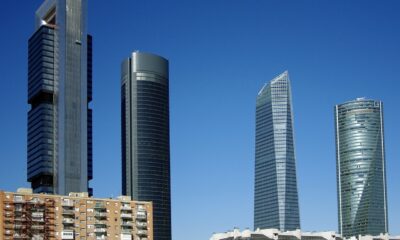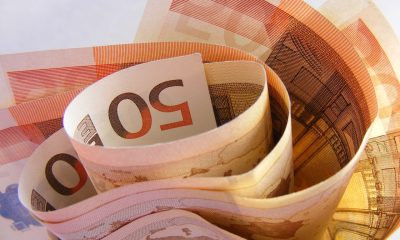Business
Spain’s GDP rebounds by 16.7% in the third quarter and leaves the annual fall at 8.7%
The Spanish economy rebounded by 16.7% in the third quarter of the year, thanks to the boom in household consumption during the summer, and reduced the year-on-year fall in GDP to -8.7% at the end of September, according to the National Statistics Institute (INE). Spain thus emerges from the ‘technical recession’, but will not avoid closing the year 2020 with an annual fall in GDP for the first time since 2013.

The historic rise in Spain’s GDP, which was registered in the period June to September, has allowed Spain to get out of the ‘technical recession’, which it entered during the hardest months of the pandemic by chaining two-quarters of GDP decline. However, this improvement will be insufficient to prevent the country from closing the year 2020 with a decline in its economy for the first time since 2013.
The quarterly advance of the GDP in the third quarter, which the INE will have to confirm on December 23rd, exceeds the forecasts that the government was handling, which pointed to a quarterly growth of around 13%.
Nadia Calviño, an economic vice-president, has pointed out that the data “show the strong reactivation of the economy and employment during the third quarter of the year. In an atypical context, marked by the resurgence and the absence of international tourism, the Spanish economy has grown more than 16%, almost 570,000 jobs have been created, and 80% of the workers in ERTE have left. We, therefore, have a good basis for economic recovery”.
In quarterly terms, this is the largest quarterly increase in GDP since the third quarter of 1972, when it rose by 2.2%, after the record falls brought about by the coronavirus: 5.2% in the first quarter and 17.8% in the second.
Read more about Spain’s economy and find the latest economic news around the world with the Born2Invest mobile app.
Household consumption shoots up 20.7%
Household consumption was mainly responsible for the recovery of GDP in the third quarter, with a 20.7% rebound after falling almost the same amount (-20.4%) in the second quarter.
Household spending on durable goods, whose purchases had been postponed during the second quarter, shot up by 60.9%. The effect ‘dammed demand’ for such products (appliances, vehicles, etc.) triggered this item.
Business investment also grew (measured through Gross Capital Formation), by 17.8%. In particular, companies took advantage of the summer to buy transport equipment (+69.7%). Investment in housing, meanwhile, grew by 16.6%, compared to the 22.6% decline in the second quarter.
Meanwhile, public spending increased between July and September by 1.1%, eight tenths more than in the second quarter, while spending on consumption by nonprofit institutions and serving households fell by 0.4%, compared to the 0.2% increase in the previous quarter.
In quarterly terms, the rise in GDP was due to the increased contribution of national demand, although in annual terms it subtracted 7.8 points from the year-on-year change in GDP in the third quarter, 11 points more than in the second quarter. For its part, external demand subtracted 0.9 points, which is 1.8 points more than last quarter.
Exports and imports also recovered during the summer, with increases of 9.5% and 7.6%, respectively. Both variables remain, however, below the levels of 2019 (-5% year-on-year for imports and -6% for exports.
Evolution of employment
To measure employment, it is advisable to follow the evolution of the hours actually worked, since these leave out the workers who are in ERTE and continue to be considered employed despite not working.
This variable shot up in the third quarter by 24.7% over the previous quarter. This rate reflects higher growth than that of full-time equivalent jobs (up 16%, or 33.7 points more than in the second quarter), due to the increase in the number of part-time full-time workers (+7.5%).
In year-on-year terms, hours worked fell by 6.2%, 18.7 points higher than in the second quarter. Full-time equivalent jobs fell by 5.5%, 12.9 points more than in the second quarter, which means that 1.01 million full-time equivalent jobs were destroyed in one year.
__
(Featured image by Alex Azabache via Pexels)
DISCLAIMER: This article was written by a third party contributor and does not reflect the opinion of Born2Invest, its management, staff or its associates. Please review our disclaimer for more information.
This article may include forward-looking statements. These forward-looking statements generally are identified by the words “believe,” “project,” “estimate,” “become,” “plan,” “will,” and similar expressions. These forward-looking statements involve known and unknown risks as well as uncertainties, including those discussed in the following cautionary statements and elsewhere in this article and on this site. Although the Company may believe that its expectations are based on reasonable assumptions, the actual results that the Company may achieve may differ materially from any forward-looking statements, which reflect the opinions of the management of the Company only as of the date hereof. Additionally, please make sure to read these important disclosures.
First published in vozpopuli, a third-party contributor translated and adapted the article from the original. In case of discrepancy, the original will prevail.
Although we made reasonable efforts to provide accurate translations, some parts may be incorrect. Born2Invest assumes no responsibility for errors, omissions or ambiguities in the translations provided on this website. Any person or entity relying on translated content does so at their own risk. Born2Invest is not responsible for losses caused by such reliance on the accuracy or reliability of translated information. If you wish to report an error or inaccuracy in the translation, we encourage you to contact us.

-

 Crowdfunding1 week ago
Crowdfunding1 week agoSpain’s Real Estate Crowdfunding Boom: Opportunity, Access, and Hidden Risks
-

 Fintech4 days ago
Fintech4 days agoDruo Doubles Processed Volume and Targets Global Expansion by 2026
-

 Impact Investing2 weeks ago
Impact Investing2 weeks agoIntesa Sanpaolo’s 2026–2029 Growth and ESG Strategy
-

 Business2 days ago
Business2 days agoTopRanked.io Weekly Affiliate Digest: What’s Hot in Affiliate Marketing [Health Trader Affiliate Program Review]
























